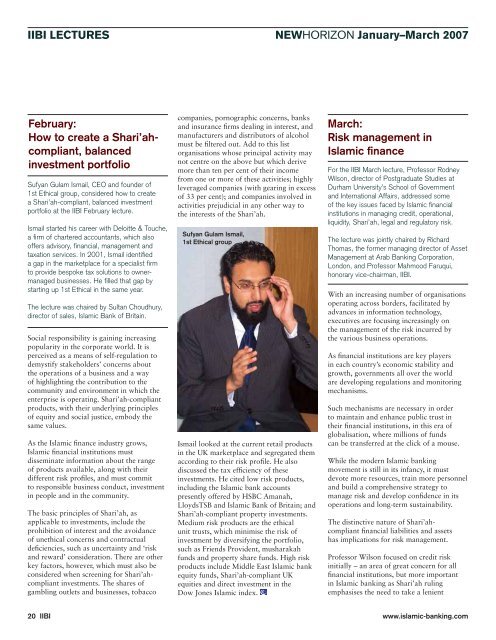issue no. 163 - january–march 2007 / muharram–rabi al awwal 1428
issue no. 163 - january–march 2007 / muharram–rabi al awwal 1428
issue no. 163 - january–march 2007 / muharram–rabi al awwal 1428
- No tags were found...
Create successful ePaper yourself
Turn your PDF publications into a flip-book with our unique Google optimized e-Paper software.
IIBI LECTURES<br />
NEWHORIZON January–March <strong>2007</strong><br />
February:<br />
How to create a Shari’ahcompliant,<br />
b<strong>al</strong>anced<br />
investment portfolio<br />
Sufyan Gulam Ismail, CEO and founder of<br />
1st Ethic<strong>al</strong> group, considered how to create<br />
a Shari’ah-compliant, b<strong>al</strong>anced investment<br />
portfolio at the IIBI February lecture.<br />
Ismail started his career with Deloitte & Touche,<br />
a firm of chartered accountants, which <strong>al</strong>so<br />
offers advisory, financi<strong>al</strong>, management and<br />
taxation services. In 2001, Ismail identified<br />
a gap in the marketplace for a speci<strong>al</strong>ist firm<br />
to provide bespoke tax solutions to ownermanaged<br />
businesses. He filled that gap by<br />
starting up 1st Ethic<strong>al</strong> in the same year.<br />
The lecture was chaired by Sultan Choudhury,<br />
director of s<strong>al</strong>es, Islamic Bank of Britain.<br />
Soci<strong>al</strong> responsibility is gaining increasing<br />
popularity in the corporate world. It is<br />
perceived as a means of self-regulation to<br />
demystify stakeholders’ concerns about<br />
the operations of a business and a way<br />
of highlighting the contribution to the<br />
community and environment in which the<br />
enterprise is operating. Shari’ah-compliant<br />
products, with their underlying principles<br />
of equity and soci<strong>al</strong> justice, embody the<br />
same v<strong>al</strong>ues.<br />
As the Islamic finance industry grows,<br />
Islamic financi<strong>al</strong> institutions must<br />
disseminate information about the range<br />
of products available, <strong>al</strong>ong with their<br />
different risk profiles, and must commit<br />
to responsible business conduct, investment<br />
in people and in the community.<br />
The basic principles of Shari’ah, as<br />
applicable to investments, include the<br />
prohibition of interest and the avoidance<br />
of unethic<strong>al</strong> concerns and contractu<strong>al</strong><br />
deficiencies, such as uncertainty and ‘risk<br />
and reward’ consideration. There are other<br />
key factors, however, which must <strong>al</strong>so be<br />
considered when screening for Shari’ahcompliant<br />
investments. The shares of<br />
gambling outlets and businesses, tobacco<br />
companies, por<strong>no</strong>graphic concerns, banks<br />
and insurance firms de<strong>al</strong>ing in interest, and<br />
manufacturers and distributors of <strong>al</strong>cohol<br />
must be filtered out. Add to this list<br />
organisations whose princip<strong>al</strong> activity may<br />
<strong>no</strong>t centre on the above but which derive<br />
more than ten per cent of their income<br />
from one or more of these activities; highly<br />
leveraged companies (with gearing in excess<br />
of 33 per cent); and companies involved in<br />
activities prejudici<strong>al</strong> in any other way to<br />
the interests of the Shari’ah.<br />
Sufyan Gulam Ismail,<br />
1st Ethic<strong>al</strong> group<br />
Ismail looked at the current retail products<br />
in the UK marketplace and segregated them<br />
according to their risk profile. He <strong>al</strong>so<br />
discussed the tax efficiency of these<br />
investments. He cited low risk products,<br />
including the Islamic bank accounts<br />
presently offered by HSBC Amanah,<br />
LloydsTSB and Islamic Bank of Britain; and<br />
Shari’ah-compliant property investments.<br />
Medium risk products are the ethic<strong>al</strong><br />
unit trusts, which minimise the risk of<br />
investment by diversifying the portfolio,<br />
such as Friends Provident, musharakah<br />
funds and property share funds. High risk<br />
products include Middle East Islamic bank<br />
equity funds, Shari’ah-compliant UK<br />
equities and direct investment in the<br />
Dow Jones Islamic index.<br />
March:<br />
Risk management in<br />
Islamic finance<br />
For the IIBI March lecture, Professor Rodney<br />
Wilson, director of Postgraduate Studies at<br />
Durham University’s School of Government<br />
and Internation<strong>al</strong> Affairs, addressed some<br />
of the key <strong>issue</strong>s faced by Islamic financi<strong>al</strong><br />
institutions in managing credit, operation<strong>al</strong>,<br />
liquidity, Shari’ah, leg<strong>al</strong> and regulatory risk.<br />
The lecture was jointly chaired by Richard<br />
Thomas, the former managing director of Asset<br />
Management at Arab Banking Corporation,<br />
London, and Professor Mahmood Faruqui,<br />
ho<strong>no</strong>rary vice-chairman, IIBI.<br />
With an increasing number of organisations<br />
operating across borders, facilitated by<br />
advances in information tech<strong>no</strong>logy,<br />
executives are focusing increasingly on<br />
the management of the risk incurred by<br />
the various business operations.<br />
As financi<strong>al</strong> institutions are key players<br />
in each country’s eco<strong>no</strong>mic stability and<br />
growth, governments <strong>al</strong>l over the world<br />
are developing regulations and monitoring<br />
mechanisms.<br />
Such mechanisms are necessary in order<br />
to maintain and enhance public trust in<br />
their financi<strong>al</strong> institutions, in this era of<br />
glob<strong>al</strong>isation, where millions of funds<br />
can be transferred at the click of a mouse.<br />
While the modern Islamic banking<br />
movement is still in its infancy, it must<br />
devote more resources, train more personnel<br />
and build a comprehensive strategy to<br />
manage risk and develop confidence in its<br />
operations and long-term sustainability.<br />
The distinctive nature of Shari’ahcompliant<br />
financi<strong>al</strong> liabilities and assets<br />
has implications for risk management.<br />
Professor Wilson focused on credit risk<br />
initi<strong>al</strong>ly – an area of great concern for <strong>al</strong>l<br />
financi<strong>al</strong> institutions, but more important<br />
in Islamic banking as Shari’ah ruling<br />
emphasises the need to take a lenient<br />
20 IIBI www.islamic-banking.com
















